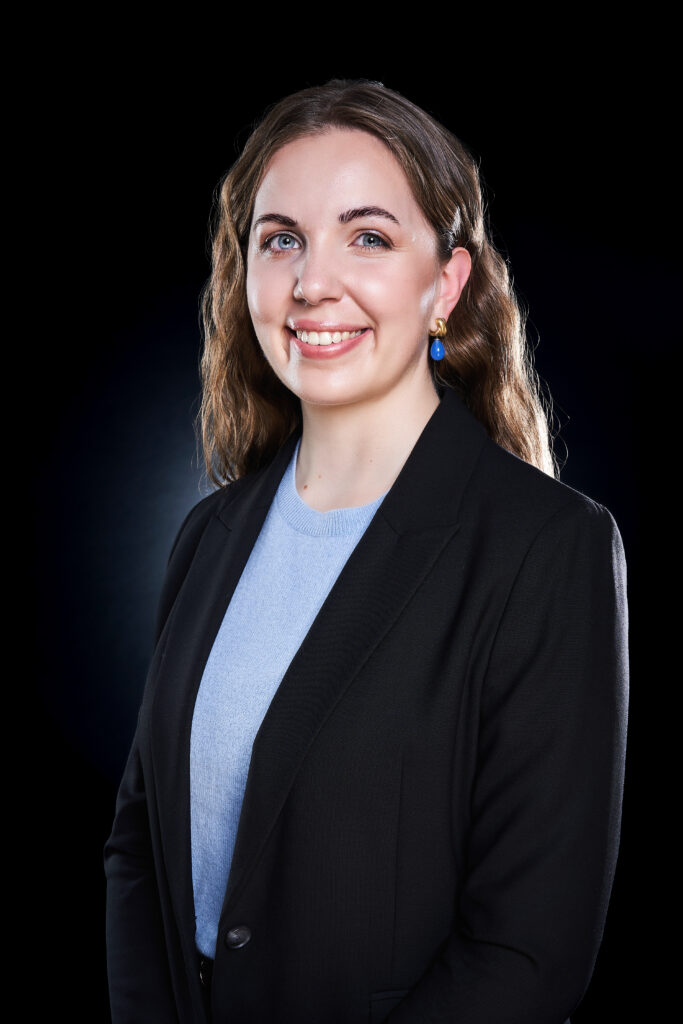Printer cartridges, patents and networks – a portrait of Friederike Lammert

„It actually all started with the printer cartridge. That’s why I’m now working and researching at the university,“ said 26-year-old lawyer Friederike Lammert. She moved to Freiburg to study law and successfully completed her first state examination in law in 2020. Ever since then, she has been working as a research assistant at Prof. Dr. Maximilian Haedicke’s Chair of Intellectual Property, where she is doing her doctorate on a patent law topic: the market entry of generic medicinal products.
But what role does the printer cartridge play in her career path? When Lammert was working on her student research project in patent law in 2018 as part of the university’s specialization examination, she dealt intensively with a ruling by the Federal Court of Justice on a drum unit. She wanted to bring something illustrative with her for the subsequent presentation: „As a layperson, you can’t really imagine what a drum unit looks like. So I went to a copy store, asked for an empty printer cartridge and then brought it to the presentation. The seminar was my first in-depth insight into patent law, and it is still the most exciting area of law for me today. The printer cartridge in the photo symbolizes my start in patent law.“
Lammert was fascinated by the academic work from the very beginning. „I already worked at the chair as a student and I think this ‘backstage’ view at the university very exciting.“ This allowed her to observe and learn first-hand how lectures and textbooks are created. Since working as a research assistant, Lammert has regularly held lectures herself and is working on her first publications. This is an exciting change of perspective for Lammert, who previously attended lectures as one of many students and is now getting to know the other side of the lecture hall. Looking back, Lammert could have imagined working at a chair earlier in her studies. „I lacked the courage to make an unsolicited application in the first few semesters. In hindsight, I should have dared to do it earlier.“ She says that today she encourages students in her courses to apply for positions at academic chairs and get involved at the university.
Lammert herself was elected to the Senate and the Faculty Council of the Faculty of Law by the doctoral students and was thus able to gain experience within academic self-administration: The fact that doctoral candidates have a seat on appointment committees and that the aspect of supervision competence was anchored in the university’s appointment guidelines is partly thanks to her. „With its many disciplines, the university is incredibly diverse and an inspiring environment for us researchers. It offers a certain framework and at the same time a lot of freedom as well as the opportunity to dedicate yourself to your own research work in depth. We also receive the necessary resources for this.“
On the one hand, Lammert describes how enriching she finds working at the university as a research assistant and that it motivates her to create knowledge in an inspiring environment such as the university. On the other hand, it is clear that she faces challenges as a young woman in patent law: „As women, we encounter few role models in this professional field, so we have to rely a lot on networking. For example, there is the Justitia Mentoring Program at the Faculty of Law at the University of Freiburg. I was already a member as a student and the exchange with an older student helped me a lot. Now I’m a mentor myself. A network like that is important.“
Lammert is also a member of the women in IP [Intellectual Property] network and the German Association of Female Lawyers. The patent law profession tends to be male-dominated, as it is considered to be particularly technical. This makes professional networking and support all the more important for Lammert: „I am sure that we can strengthen each other in a group of women. Sharing experiences is always enriching. I also get to see examples of career paths for women. I am interested in the career path as a lawyer and working in law firms that handle patent litigation. But I also think about how you manage to have a family life as well as being successful in your career.“ As a result, Lammert, who describes herself as a family person, sees finding a balance between family and career as a particularly challenging task for women.
Lammert hopes that the teaching and the networks from which she herself has benefited will inspire the next generation of women to pursue a career in patent law. „If more women work in patent law, then more women will consider it as an option because then there would be the necessary role models for the next generation.“ That is why she wants to call out to young women: „Look for a field of research that excites you and start networking!“ Patent law would certainly be an exciting choice for this.


Portrait by Elisa Rijntjes
Elisa Rijntjes is studying Liberal Arts and Sciences at the University College Freiburg. Being half Greek and half Dutch, she grew up trilingual and is passionate about everything related to languages, history and culture. In her Culture and History major, she focuses on these exact subjects with an emphasis on journalism. Outside of university, she dances ballet and plays the piano.